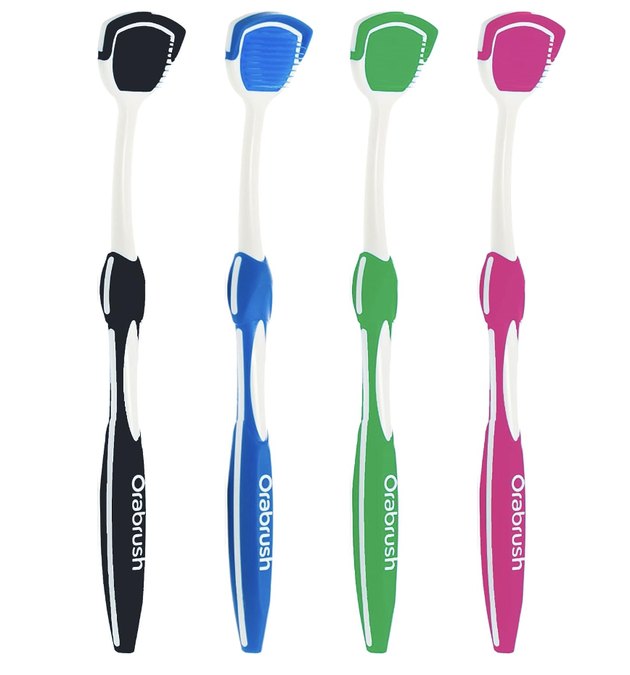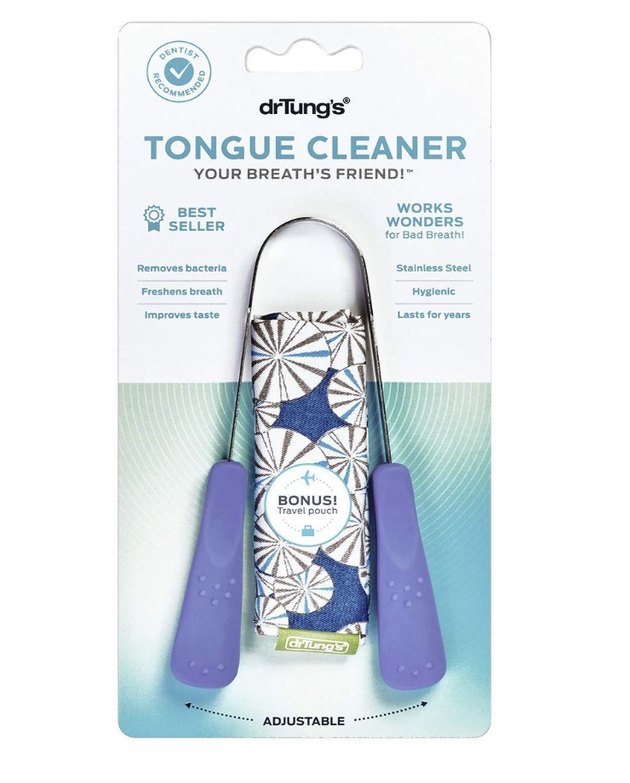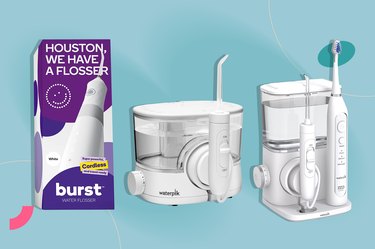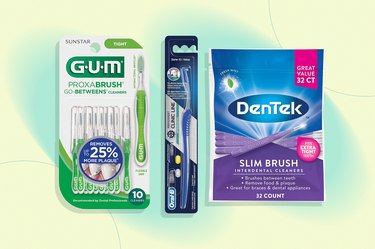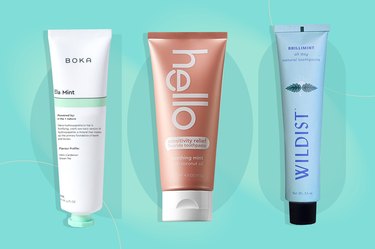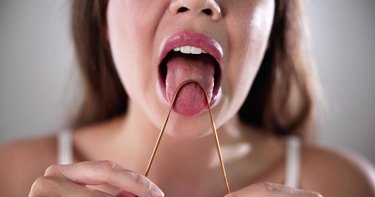
If you've heard that tongue scraping can make your mouth — and the rest of your body — healthier, you might be wondering whether you should get on board with the wellness trend.
Tongue scraping involves using a metal or plastic tool to gently scrape the surface of your tongue. A quick search online will lead you to all kinds of articles claiming it does more than clean your tongue — like protect against diseases or even make food taste better.
Video of the Day
Video of the Day
But is this all legit? Here's a closer look at the claimed benefits of tongue scraping.
1. It May Help Freshen Your Breath
Some EvidenceIf you've been battling some smelly breath, tongue scraping might be able to help.
Bad breath is caused by bacteria and food particles that get trapped in the crevices between the papillae — where your taste buds live — on your tongue, per the Cleveland Clinic.
"Brushing your tongue sometimes doesn't get into the crevices the way a scraper would," says Melissa Calhoun, RDH, a registered dental hygienist in San Diego. "And the more bacteria you can get rid of, the less likely you may be to experience odor," she adds.
There is limited current research about tongue scraping to reduce bad breath, but there are a few older studies. One worth noting is from a September 2006 issue of General Dentistry, which concluded that tongue scraping can slightly reduce bad breath in adults, at least temporarily. The breath-freshening effects might wear off once you eat or drink, though.
That said, a more recent December 2021 study in the International Journal of Environmental Research and Public Health concluded that mechanically cleaning your tongue significantly reduces bad breath, no matter the method used (i.e., using a toothbrush, a tongue scraper or both).
2. It Might Improve Your Oral Health
Some EvidenceMechanically removing bacteria from your tongue can also help prevent coating and plaque buildup.
Bacteria and food particles that hang out in your mouth can contribute to the development of a thick, white film on your tongue, also known as white tongue, per the Cleveland Clinic. Causes of white tongue include:
- Poor oral hygiene
- Smoking
- Drinking alcohol
- Wearing dentures
- Taking antibiotics
- Eating a diet low in fruits and vegetables
- Dry mouth
Poor oral hygiene can also lead to the development of plaque — the sticky substance that builds up on teeth and can lead to tooth decay and gum disease, according to the Cleveland Clinic.
Similar to studies on tongue scraping to reduce bad breath, there is limited research on tongue scraping to remove white coating and plaque, in particular.
Most older studies do conclude, however, that scraping and brushing your tongue are equally effective, like a September 2013 study in the International Journal of Clinical Pediatric Dentistry, which states that scraping away any lingering bacteria or food bits seems to work as well as tongue brushing for removing plaque.
No matter the method of cleaning, less plaque can mean fewer cavities and less risk for gum problems like gingivitis, notes Michael Wei, DDS, a dentist based in New York City.
You can also prevent plaque through methods like regular tooth brushing, flossing and routine visits to the dentist.
3. Some People Claim It Protects Your Overall Health
No EvidenceExperts can't say for sure whether tongue scraping will support or improve systemic health. There's not enough research drawing direct connections between tongue scraping and reduced risk of disease.
That said, your oral health can have a larger effect on other parts of your body. The bacteria that live in your mouth can not only cause oral health issues like gum disease, but it's also thought to play a role in other health problems like heart disease, endocarditis (an infection of the inner lining of your heart) and pneumonia, per the Mayo Clinic.
The Harvard T.H. Chan School of Public Health also mentions that most oral diseases share common risk factors with chronic diseases like heart disease, cancer, diabetes and respiratory diseases. These risk factors can be poor diet, eating foods high in sugar and tobacco and alcohol use.
Ultimately, if you're brushing and flossing regularly (and visiting the dentist), you're benefiting your oral health and, thereby, your overall health. There's no proven benefit here when it comes to tongue scraping specifically.
Is Tongue Scraping Better Than Brushing Your Tongue?
Based on the research we've found, tongue scraping seems to work just as well as brushing your tongue to get rid of bacteria, remove plaque and support your oral (and therefore overall) health. In other words, tongue scraping is not necessarily any better than good-old tongue brushing.
But some dentists will still recommend the practice because it can get into the crevices of your tongue and possibly do a better job of freshening your breath.
Bottom line: If you have time and you'd like to try tongue scraping, great! You don't have to do it, but it's something you can do if you want to.
But if not, brushing twice a day and flossing at least once a day are the most important steps to supporting your oral health, Calhoun says.
Tip
If you notice you have chronic bad breath, a white coated tongue or other dental health concerns that won't go away even with brushing, flossing and scraping, visit your dentist who can diagnose your issue. You may have a cavity or gum disease, which may require procedures, medications and other forms of treatment.
How to Scrape Your Tongue
While research shows that brushing your tongue has about the same benefit as tongue scraping, you can still try tongue scraping for an extra-clean feel and fresh breath. It's completely harmless and (if done carefully) can become a staple in your dental health routine.
Here are the steps to take, according to Calhoun:
- Break out your tongue scraper after brushing and flossing your teeth.
- Stick out your tongue.
- Run the tongue scraper across your tongue's surface from back to front using light pressure.You can repeat this motion to get any areas of your tongue that weren't scraped on the first pass. One or two more times should be enough.
- Rinse your mouth when done.
"You should feel [the scraper], but it shouldn't hurt. If you press too hard, you could end up scratching your tongue," Calhoun says.
Another tip: Be sure to rinse your scraper in between each pass to get rid of any bacteria or food particles, Calhoun recommends.
When you're finished scraping, rinse your device again and place it on a clean surface (like a clean, dry washcloth) to dry. Calhoun suggests replacing your scraper every three months, just like your toothbrush.
Dentist-Recommended Tongue Scrapers
If you're in the market for a tongue scraper, Dr. Wei recommends the Orabrush Tongue Scraper. It's made of flexible, high-quality plastic that feels gentle on your tongue.
"It's designed to remove bacteria, food debris and other residue from the tongue that can cause bad breath. It's also easy to clean and store," he says.
Or for a metal version, you can also try DrTung's stainless steel tongue scraper.
- General Dentistry: "A Cochrane systematic review finds tongue scrapers have short-term efficacy in controlling halitosis"
- International Journal of Clinical Pediatric Dentistry: "The Comparative Evaluation of the Effects of Tongue Cleaning on Existing Plaque Levels in Children"
- My Manhattan Cosmetic Dentist: "Michael Wei, DDS"
- Cleveland Clinic: "Tongue"
- Instagram.com: "Melissa Calhoun, RDH"
- International Journal of Environmental Research and Public Health: "The Effect of Mechanical Tongue Cleaning on Oral Malodor and Tongue Coating"
- Cleveland Clinic: "Dental Plaque"
- Cleveland Clinic: "White Tongue"
- Harvard T.H. Chan School of Public Health: "Oral Health"
Is this an emergency? If you are experiencing serious medical symptoms, please see the National Library of Medicine’s list of signs you need emergency medical attention or call 911.
